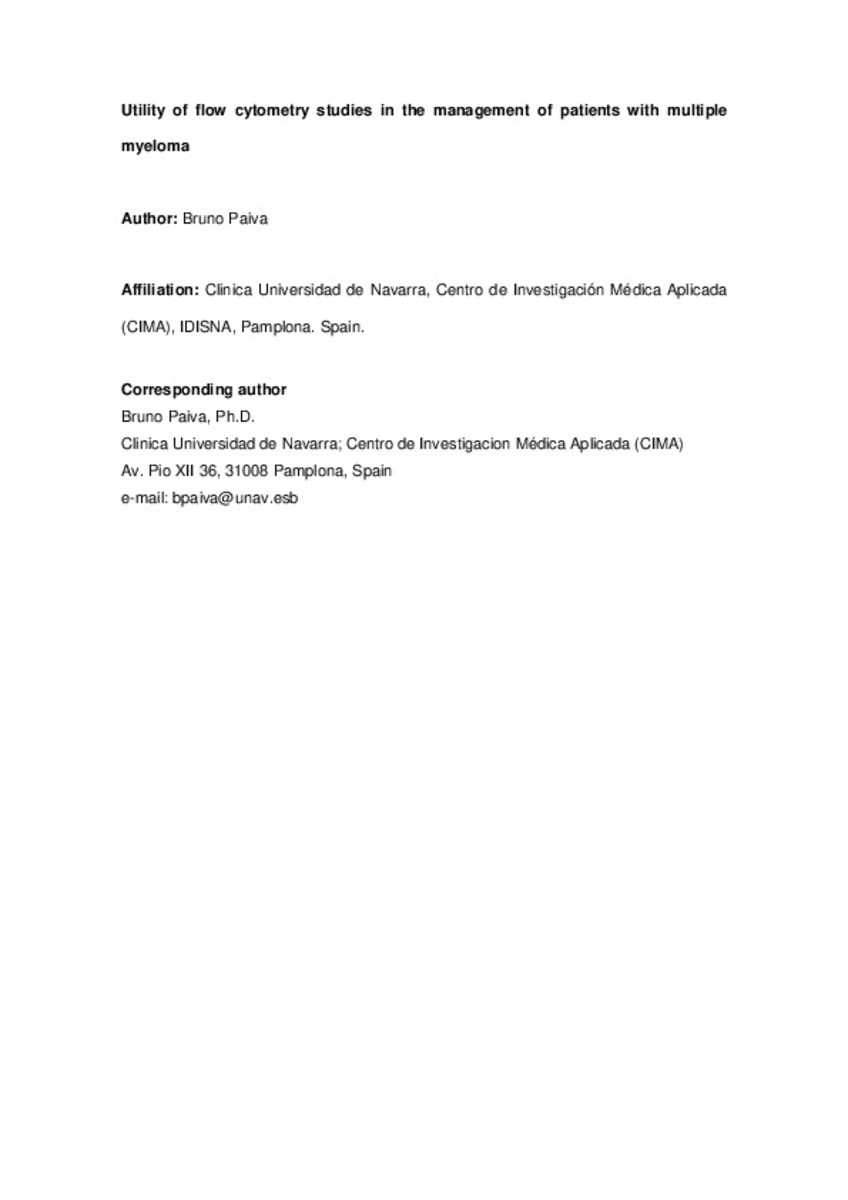Full metadata record
| DC Field | Value | Language |
|---|---|---|
| dc.creator | Paiva, B. (Bruno) | - |
| dc.creator | Merino, J. (Juana) | - |
| dc.creator | San-Miguel, J.F. (Jesús F.) | - |
| dc.date.accessioned | 2018-05-09T10:17:30Z | - |
| dc.date.available | 2018-05-09T10:17:30Z | - |
| dc.date.issued | 2016 | - |
| dc.identifier.citation | Paiva, B. (Bruno); Merino, J. (Juana); San-Miguel, J.F. (Jesús F.). "Utility of flow cytometry studies in the management of patients with multiple myeloma". Current opinion in oncology. 28, 2016, 511 - 517 | es |
| dc.identifier.issn | 1040-8746 | - |
| dc.identifier.uri | https://hdl.handle.net/10171/52184 | - |
| dc.description.abstract | Purpose of review: Although the input of multiparameter flow cytometry (MFC) into the clinical management of multiple myeloma (MM) patients has faced some reluctance, continuously growing evidence supports the utility of MFC in this disease. Recent findings: MFC immunophenotyping of bone marrow and peripheral blood plasma cells affords cost-effective assessment of clonality, and provides prognostic information on the risk of progression in smoldering MM, and the identification of active MM patients with dismal outcome (e.g.: high numbers of circulating tumor cells) or long-term survival despite sub-optimal responses through the characterization of MGUS-like phenotypes. Extensive data indicates that MRD monitoring can be used as biomarker to evaluate treatment efficacy and act as surrogate for survival. The time has come to address within clinical trials, the exact role of baseline risk factors and MRD monitoring for tailored therapy in MM, which implies systematic usage of highly sensitive cost-effective, readily available and standardized MRD techniques such as MFC. Summary: Next-generation MFC should be considered mandatory in the routine evaluation of MM patients both at diagnosis and after therapy, and represents an attractive technique to integrate with high-throughput DNA and RNA-seq methods to help understanding the mechanisms behind dissemination and chemoresistance of MM. | es_ES |
| dc.description.sponsorship | This study was supported by the Cooperative Research Thematic Network grants RD12/0036/0048, RD12/0036/0058, RD12/0036/0046, RD12/0036/0069 of the Red de Cancer (Cancer Network of Excellence); Instituto de Salud Carlos III, Spain, Instituto de Salud Carlos III/Subdirección General de Investigación Sanitaria (FIS: PI060339; 06/1354; 02/0905; 01/0089/01-02; PS09/01897/01370; G03/136; Sara Borrell: CD13/00340); and Asociación Española Contra el Cáncer (GCB120981SAN), Spain. The study was also supported internationally by the International Myeloma Foundation (IMF) Junior Grant, the Black Swan Research Initiative of the IMF, the Multiple Myeloma Research Foundation research fellow award, the Qatar National Research Fund (QNRF) Award No. 7-916-3-237, the AACR-Millennium Fellowship in Multiple Myeloma Research (15-40-38-PAIV), and the European Research Council (ERC) 2015 Starting Grant. | es_ES |
| dc.language.iso | eng | es_ES |
| dc.publisher | Lippincott, Williams & Wilkins | es_ES |
| dc.relation | info:eu-repo/grantAgreement/EC/H2020/680200/EU | - |
| dc.rights | info:eu-repo/semantics/openAccess | es_ES |
| dc.subject | Materias Investigacion::Ciencias de la Salud::Hematología | es_ES |
| dc.subject | Flow cytometry | es_ES |
| dc.subject | Minimal residual disease | es_ES |
| dc.subject | Circulating tumor cells | es_ES |
| dc.subject | Survival | es_ES |
| dc.title | Utility of flow cytometry studies in the management of patients with multiple myeloma | es_ES |
| dc.type | info:eu-repo/semantics/article | es_ES |
| dc.relation.publisherversion | https://journals.lww.com/co-oncology/Abstract/2016/11000/Utility_of_flow_cytometry_studies_in_the.9.aspx | es_ES |
| dc.editorial.note | Creative Commons Attribution – Non-Commercial (CC BY-NC) | es_ES |
| dc.identifier.doi | 10.1097/CCO.0000000000000331 | - |
Files in This Item:
Statistics and impact
Items in Dadun are protected by copyright, with all rights reserved, unless otherwise indicated.






